
views
Distancing Yourself from the Dream
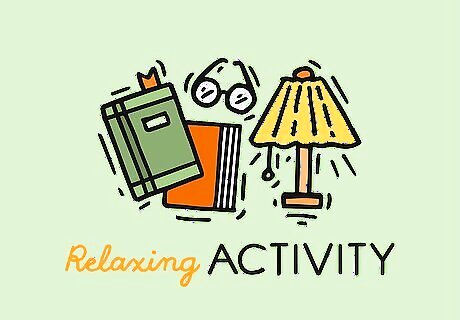
Do something relaxing. Instead of focusing on the clock and calculating how late it is and how much more sleep you need, try to find a way to distract yourself in a relaxing way. For example, read a chapter or two of a good book before you try to fall back to sleep. Try to select a book which has a topic far removed from the content of your bad dream: if, for example, you were hiking in your dream and fell off a cliff, avoid adventure novels and instead read a few pages of historical fiction or a romance novel. You should avoid doing anything that is challenging or overly engaging, such as homework, office-work, or housework.

Consider taking a warm bath. Many people find that taking a warm bath is a helpful part of their regular bedtime routine. If you are struggling to calm down after having a bad dream, a relaxing bath or shower could sooth both your mind and body.

Do some gentle yoga stretches. After having been woken up by a bad dream, your mind is of course troubled, but your body may also be tense and stressed. Recent studies have indicated that yoga practice can lead to improved sleep. Thus, in an effort to help you relax both your mind and your muscles, consider doing a little yoga before going back to bed. The best poses to try are easy resting and inversion poses, such as Easy Forward Bend (variation of Sukhasan), Standing Forward Bend (Uttanasan), Child's Pose (Balasana), and Legs Up the Wall Pose (Viparita Karani). Be sure to keep your stretches and poses gentle, and avoid working up a sweat or getting your heart rate too high. It's important that you don't push yourself past your comfort zone or hold a pose that hurts. It's also a smart idea to learn from a qualified professional, who can help you learn the poses properly and learn to adjust them for your body.
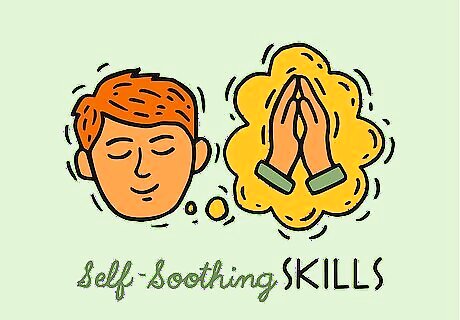
Practice self-soothing skills. You may find that you can calm yourself down and distance yourself from a bad dream by practicing meditation, prayer, or by doing breathing exercises.

Play soft music. Many people report being able to fall asleep more easily when listening to the radio or to recordings of soothing music. Because this is a less engaging medium, sleep experts generally give the thumbs up to using it to help you drift off to sleep. In general, your sleep will probably be more restful if you choose instrumental music, and avoid selecting tunes which have multiple movements, some of which may be more tense and dramatic. You may also want to consider putting your music on a timer, so that it turns off after a set amount of time. Many music apps have this feature.

Play soothing nature sounds. If you find that music distracts you when you are trying to sleep, consider searching for tracks which play gentle, relaxing nature sounds. For example, you can find cd's or apps with recordings of ocean waves, rain falling, or quiet animal-life sounds.

Get out of bed. If you've just been jerked awake from a bad dream, forcing yourself to fall right back to sleep could send you back to the troubling dream, which can in turn lead to more fitful, restless sleep. You may also not be able to fall back asleep for a while if you're upset. If this is the case, sleep experts recommend that you get up and if possible, leave the room. Doing this reinforces the message that your bed is a place of rest. Even though you may be worried about needing to get a certain amount of sleep, allow yourself to stay awake for a period so that the bad dream can fade away and so that your mind can center on more positive thoughts.

Avoid turning on the television. Sleep experts generally recommend that we reduce our screen time before going to bed. They tell us that the blue-light emitted from electronic devices can interrupt our natural sleep cycles. Beyond this, television is an engaging medium, which means that we may be overly stimulated when watching it, which can in turn make it harder to fall asleep.
Understanding and Analyzing Your Bad Dream

Keep a dream journal. By writing down the frequency and the content of your dreams, you may be able to recognize patterns. This can in turn help you pinpoint the cause of your troubling dreams, make sense of them, and distance yourself emotionally from them. Recurring bad dreams often include more threatening content, and so can linger longer, bother us more throughout the day, and of course cause added anxiety as bedtime approaches. Thus, it's all the more important that you try to figure out why they are occurring, and a dream journal can help you with that.

Pay attention to the content of your dreams. Most of the content of our dreams tends to be autobiographical: the people in our dreams are mostly people we know and interact with regularly, and most of the things we do in our dreams are drawn from our daily lives. For example, pregnant people tend to dream more about pregnancy, birth, and childcare, while health care workers tend to dream more about their patients. When you pay attention to the content of your dream, you can begin to understand what your mind is trying to tell you: are you worried about an upcoming event at work? Are you stressed about your relationship? If you come to realize that your dream is reflecting your stress about an aspect of your life, once you focus on handling that problem your bad dreams may subside.

Understand why we dream. Learning about why we dream can be helpful as we try to process our bad dreams and get some perspective. Understanding what our mind is doing while it's dreaming can help us realize that it's a normal process which sometimes results in bad dreams. Our brain uses the dreaming process to sort through our experiences and emotions, process the information we've taken in throughout the day, and begin to form memories.

Learn about dream lags. Our experiences aren't always processed by the brain immediately. It can sometimes take days or even weeks for an experience to work its way into our dreams.Researchers hypothesize that this is a way for our shorter term memories to be incorporated into our longer term memory. Why should you care about this? If you realize that your bad dream is just a result of your brain processing and sorting this information, you may be able to conclude that your bad dream is just your brain's way of wrapping up the experience. If this is the case, you may not need to worry about returning to the dream again.
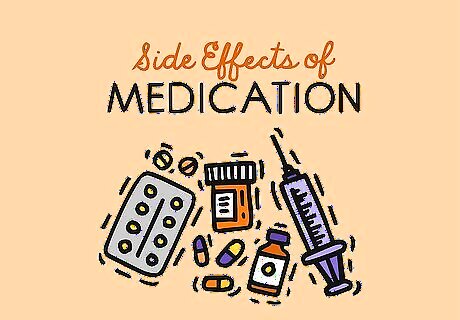
Research the side effects of your medications. Some medications can also lead to an increase in bad dreams. If you have just recently begun to experience bad dreams, examine the labels of your medication to see if bad dreams or poor sleep possible side effects. If they are, you may be able to speak with your physician about changing your prescription. If not, you'll at least know the possible reason and can take steps to manage and recover from your bad dreams.

Examine your drinking habits. Alcohol can also interfere with our sleep and may be responsible for your troubled sleep. Consider cutting out alcohol in the evening (or altogether) to see if your bad dreams decline.
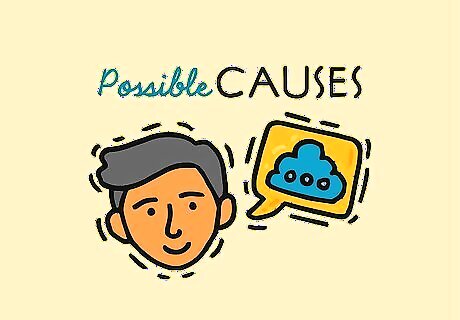
Consider other possible causes for your bad dreams. People who suffer from migraines seem to be more prone to having bad dreams, as are those with sleep apnea and those with clinical depression. If you suspect that your bad dreams are not a result of normal stress, but may instead be the symptom of some underlying physical or emotional problem, it's important that you visit your physician and/or mental health care professional as soon as possible.
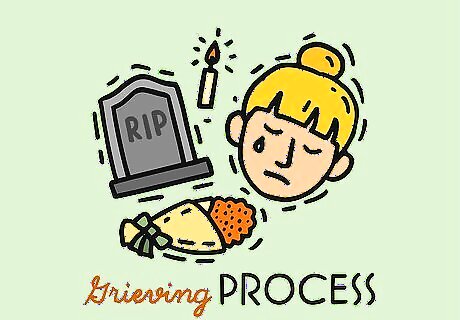
Understand that dreaming can be part of the grieving process. It's very common for people who have suffered a loss or a traumatic event to experience bad dreams and to be affected by them. This can be both emotionally helpful and harmful. For some people, the dreams about their loss can increase their depression, but others report that the dreams eventually help them come to terms with their loss. Once you realize that bad dreams are to be expected after a difficult experience, you may rest better knowing that dreams are part of the grieving process. Just as your sadness will eventually fade or become more manageable, so too will your bad (or sad) dreams also become less frequent.
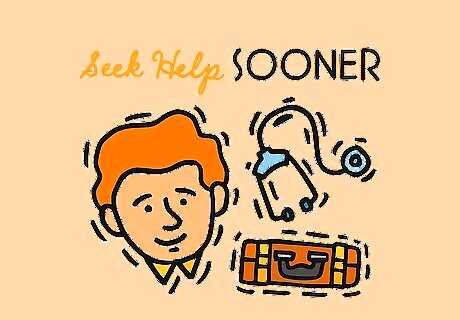
Seek help sooner rather than later if your dreams trouble you. You shouldn't hesitate to seek professional help if you think that your dreams are prompted by grief, trauma, anxiety or stress. Your doctor or counselor will ask you how you've been feeling: be sure to discuss how you've been sleeping and what your dreams have been like as you begin to answer this question.
Helping Your Child Get Over a Bad Dream
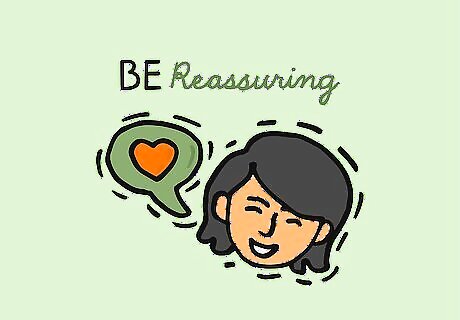
Be reassuring. If your child wakes from a bad dream or nightmare, be sure to respond quickly to her calls, and calmly and lovingly reassure her that you are there for her, and that she is safe. It can be tough for children to distinguish between the real feelings that they experience in their dreams and reality. Your calm presence will help relax your child, and will help her realize that she was just dreaming.

Label the experience. Your child may be confused when he first wakes from a bad dream, and needs to know what just happened. He may be worried that there is still a bad guy in the house, for example, so you need to quickly help him figure out that he was dreaming. Tell him, “You had a bad dream, but I'm here, it's gone, and you're ok.”
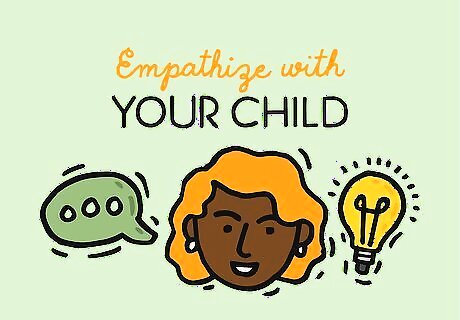
Empathize with your child. Explain to your child that everyone has bad dreams, and that you know how scary they can be. Even though you want your child to get over her fear, be careful not to dismiss it, and let her know that it's ok to be scared and upset as a result of having a bad dream.
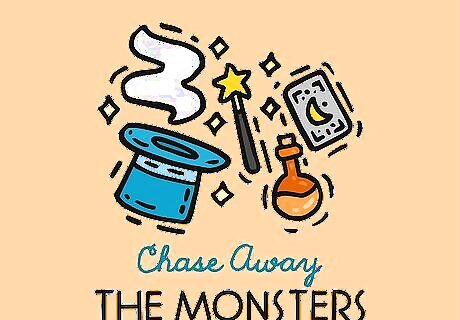
Chase away the monsters (or the bad dreams). With younger children in particular, you may have good results getting your child to fall back asleep if you prepare magic “potions” or “spells” to cast away the demons, monsters, or bad dreams. Prepare a monster spray (water in a decorated spray bottle) or good dream dust that you can sprinkle around the room.
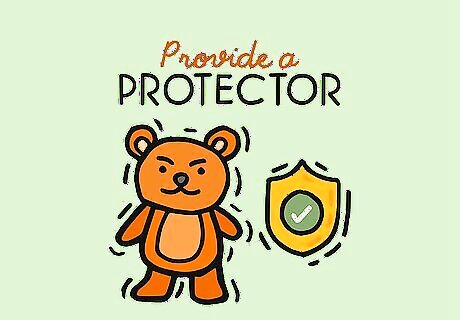
Provide your child with a protector. If after talking together and cuddling your child is still nervous about falling back to sleep, she may be calmed if you provide her with a special stuffed animal or toy whose special job it is to protect your child from bad dreams. Have a special talk with “Mr. Hippo,” for example, and remind the toy that he needs to help your child have good dreams and chase away all of the bad dreams.
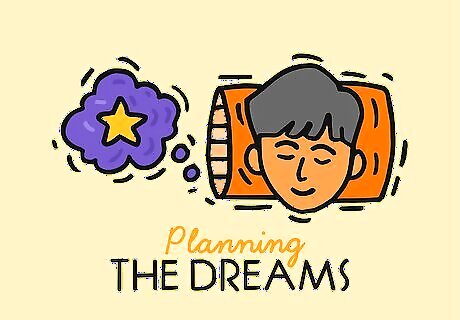
Try planning your child's dreams. If your child is nervous about falling back to sleep, take some time to talk about what she'd like to dream about instead. Create a story with your child as the “star” and her friends or toys as the other players in the dream: what are they going to do together when she falls back asleep? Add plenty of details, and don't rush the story. With luck, your child will fall asleep during the story and will continue it as she dreams.

Play soft, relaxing music. This can give your child something to focus on as he tries to fall back asleep, and can mask any “scary” sounding noises from a quiet house. Prompt him to think about the story the music is telling, or ask him to describe what he sees when he listens to the music: does he see a magic forest, or twinkling stars, for example? Help him come up with soothing visualizations to match the music, and he may become more relaxed and less likely to return to his bad dream.

Talk to your child in the morning. Your child may not be willing to share the scary details of his dream when he first wakes up, and you shouldn't press him if he's reluctant. See if he's ready to talk about it in the morning, though. This can also be a good opportunity for you to figure out if your child's bad dream was a normal occurrence or if it's a symptom of bigger problem, such as anxiety about school or friends or depression.

Help your child rewrite her dreams. During the day, your child may be open to talking about her bad dream in more detail. Encourage her to rewrite the dream with a happier ending, or to revise it so that she is able to defeat all of the monsters or bad guys. This can make her feel less vulnerable to her dreams in general and give her back a sense of control and power.
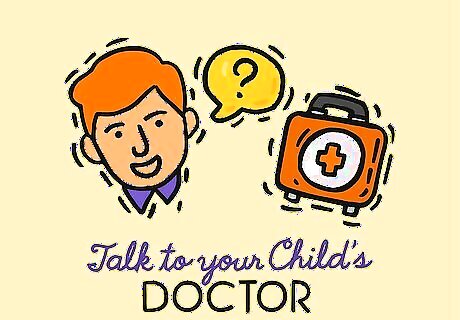
Talk to your child's doctor. If your child's bad dreams or nightmares become recurrent, you should check in with the pediatrician. Do this especially if your child's sleep is being negatively affected or if you see other emotional or behavioral problems.

Talk to your child's teachers and/or school counselors. It may also be a good idea to see if your child has been struggling in school or is having problems with friends. This could be an underlying source of the bad dreams. Also, even if your child just seems to be going through a phase, it's a good idea to let her teacher know that she hasn't been sleeping as well lately in case it may be affecting her behavior or performance at school. Keeping her teacher in the loop can help protect your child from being subjected to added stress at school.
















Comments
0 comment